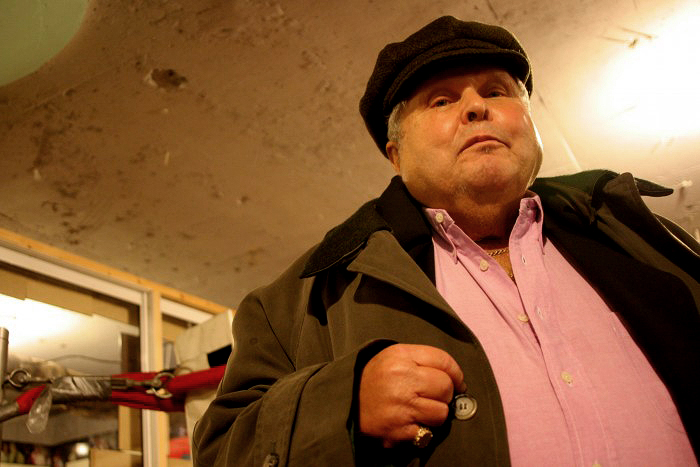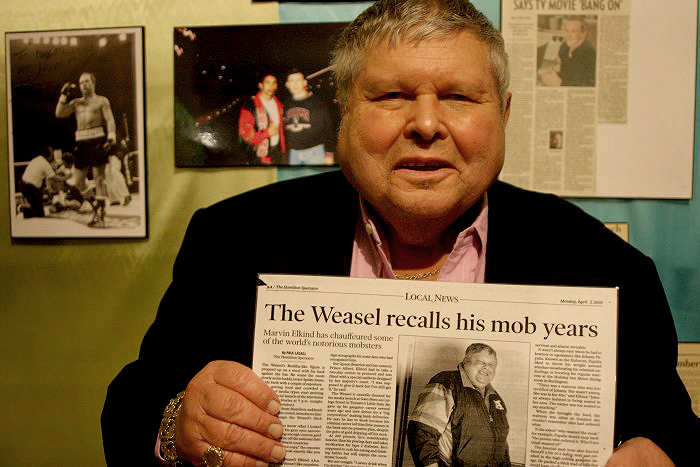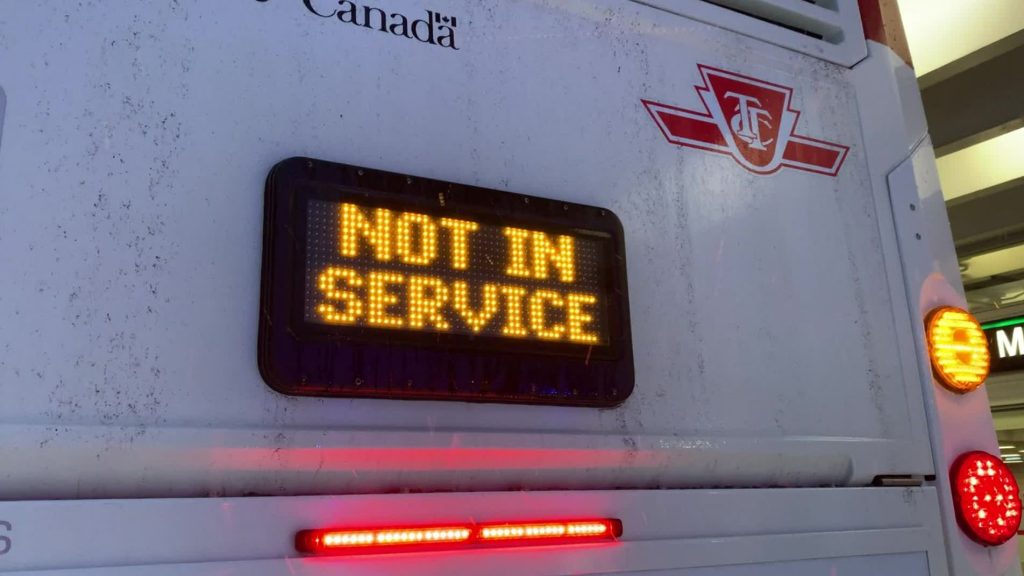Character Toronto: Jimmy Hoffa’s driver and underworld figure Marvin ‘The Weasel’ Elkind
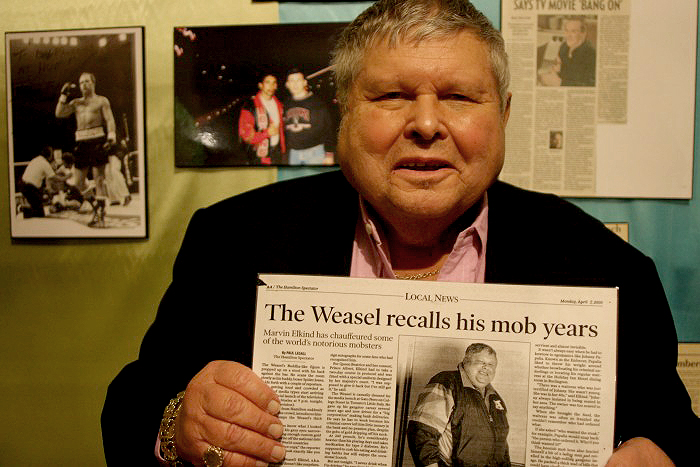
Posted July 30, 2008 12:00 pm.
Last Updated January 23, 2024 7:05 pm.
I was staring down at the little white business card Marvin Elkind handed me at the Steve Molitor title fight at CasinoRama, waiting for the man known in underworld circles as “The Weasel” to pick up the phone. The card vaguely declared him as “Director of Transportation,” and I was ready to be transported to a world most of us only catch safe glimpses of during Godfather movie marathons and Sopranos episodes — a world of fixed prize fights, doomed stool pigeons, and malignant mob bosses ordering hits.
I was starting to get nervous.
The phone rang a good seven or eight times and I was just about to hang up when someone picked up the line.
“Who’s this?” a gravely voice suspiciously inquired.
“Hello, is Marvin there please?”
“Nope.” (Long pause) “Who’s askin?”
“It’s Mike, I met Marvin at the fights and he gave me his card and said I could call him about a story.”
(An even longer pause)
“This is Marvin,” he suddenly declares, before adding, “When you’ve lived the kind of life I have, you don’t go around telling people who you are over the phone kid.”
It was my first lesson in underworld protocol, but it wouldn’t be my last. I set up an appointment to meet Elkind a few days later at an appropriate location, a boxing club, and anxiously awaited my first “sit down” with a connected guy.
The H.U.F. boxing club in Mississauga has a basement training area affectionately known as “Zee Jungle.” Unlike the upstairs portion which is drenched in sunlight, with pretty girls skimming tabloids on cardio machines, “Zee Jungle” is dark and damp, with old sweaty gloves hanging from hooks and bent-nosed fighters grunting like bulls while they pound grapefruit-sized welts into the sides of heavy bags.
This is where I wait for Marvin, who is already running a few minutes late. Will he show up? Will I insult him somehow? Will he tell me anything?
The seconds weigh on me.
A middle-aged pug starts poking at the speedbag, at first slow and steady, and then gradually building up speed, faster and faster until he orchestrates a staccato soundtrack that meshes with my mounting anxiety. Suddenly the fighter stops swatting and a comforting silence caresses me. Just as I was getting used to the serenity, the old stairs leading to the basement start to creak. After what seems like an eternal descent, Elkind stands before me and offers me his meaty hand. A giant gold pinkie ring digs into my bones.
It didn’t take Marvin long to loosen up and delve into his wealth of stories, and I soon learned it didn’t him long to dabble in crime as a young boy either. The chronic “problem child”, as he described himself with a smile, was sent to live in a Foster home at the age of 9, and quickly descended into a criminal lifestyle that seemed incompatible with his youth.
Spurned on by the encouragements of his older Foster brothers, he soon joined them on grocery store heists in Toronto’s west end.
“We would go the three of us, they’d break open a window in the back, a basement window, I was 11, I was a small kid, they would push me through and I would come upstairs and open the door and let them in. There was no such thing as safety deposit boxes in those days, the money was always in the store. If they got fifty dollars they would take most of it, and they would give me five dollars, which in those days was like a million, it was a lot of money.”
“I used to keep the money in one dollar bills so it would look like a big roll.”
Marvin would join his Foster brothers in similar misadventures for years to come, until he eventually followed one to New York City as a young man. He worked at the legendary Stillman’s boxing gym doing maintenance during the week, and on weekends he toiled away as a bus boy at the Copacabana, the legendary nightclub with notorious mob ties. Before long, clearing tables would be least of his worries.
Elkind was about to make a dramatic career change, one that would alter his life, and at times, put it in jeopardy.
“These guys would come in the Copacabana… Tony Salerno and Frankie Carbo, and these guys were very scary and they yelled at everybody and everybody was scared to serve them, but they were big tippers.”
“One day, I’ll never forget it, Salerno calls me over to the table and he says, ‘Friday is your last day here.’ ”
“I said, ‘Why, what did I do?’ ”
“He says, ‘It’s nothing about that. As of Monday you’re Jimmy Hoffa’s driver,’ and I said, ‘But I don’t want to be Jimmy Hoffa’s driver,’ and he says, ‘Nobody is asking you.’ ”
“I said, ‘I’m a Canadian,’ and he says, ‘That’s the idea.’ ”
“They had in those days in the United States, what was called conscription. Guys of a certain age they were drafted into the army. And Hoffa’s driver had been drafted. With me being a Canadian they didn’t have to worry about that.”
“They took me out took me to a store and they bought me three blazers,” Elkind explains, still somewhat enthralled with the memory of the sudden promotion. “Navy blue, royal blue and beige. Six pair of socks, half a dozen sport shirts, a coat and some pants. They explained to me how it works, and Hoffa was only in New York during the week, on the weekend he was a very family-orientated man, family was very important to him. On weekends he would go back to his family. I would pick him up Monday morning at the airport, at LaGuardia, and take him back on Friday.”
“Mr. Hoffa was a tremendously intimidating man,” Elkind adds. “This man had no fear at all, of nothing, showed very little emotion, had completely no sense of humour, and was dedicated to the people that belonged to his union. When you drive these people you learn a lot and I’ll tell you why. They don’t know you’re there. You become a piece of the car, just like an extra gear shift or a brake, and they talk.”
But talk was something Elkind was strictly forbidden to do, and his employers made it clear from the start how serious they were about enforcing the rules. On his first day on the job he received his own lesson in underworld protocol.
“So I pulled up the car and I said, ‘Good morning Mr. Hoffa.’ He said, ‘You’re Marvin?’ and I said, ‘Yes, sir.’ ”
“So he tells me to start driving and pull over up there, and these two guys get in the car, and these are his bodyguards. They get in the car and he says to me, ‘Marvin, I have got cardinal rules and rules. If you break one of the rules, nothing serious is going to happen to you. If you break one of the cardinal rules, you won’t be around the next day. Now turn around and look at the boys.’
“And both of them opened up their coats to show me they were carrying pieces. It was very scary. And he told me the cardinal rule is, what you hear in this car, stays in this car.”
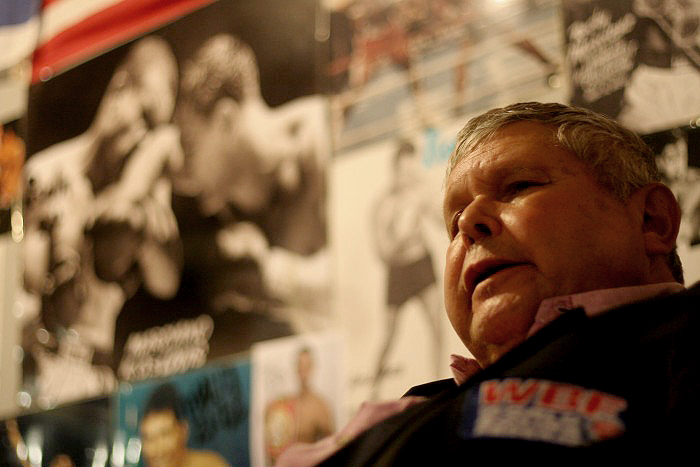
Elkind would follow the rules with the type of religious fervour that the threat of death can inspire, and ended up driving Hoffa from 1952-1956.
When I ask him about Hoffa’s mysterious disappearance, I expect to meet a blank stare and a shoulder shrug. Instead, Elkind’s usually squinty eyes widen and his voice, until now a monotone bass, begins to rise.
“I know about his disappearance, I know where he is!”
I swallow hard.
“I didn’t see it happen,” he continues. “But there’s no question in my mind, that Mr. Hoffa is in the cornerstone of the Renaissance Centre Hotel in Detroit,” he reveals.
“And my reason is this…Mr. Hoffa had just gotten out of jail. I wasn’t his driver when he was hit by the way…I was working for the Teamsters still but I was not his driver. So, I was there when they were building the Renaissance Centre in Detroit and Mr. Hoffa was in Detroit.”
“At the building they were putting the concrete down. Mr. Hoffa went missing. Now when you pour the concrete you have to put wooden forms down before you pour the concrete. It’s a tremendous sized hotel. Now he goes missing and every Teamster carpenter in the state of Michigan who was working on a highrise or was building something recreational was called off of whatever they were doing to go put those footings down, get those footings in so they could get that concrete in right away. It was a mad rush to put the concrete in. So that’s what makes me certain.”

After driving for Hoffa, Elkind worked for a slew of underworld figures and has brushed shoulders with the country’s most feared criminals.
“I drove every mafia boss in Canada outside of the first guy, Rocco Perri, I was too young. I drove them all. At one time or the other I drove every one.”
“In the fight world I drove, George Chuvalo, Muhammad Ali, Joe Frazier, who I still drive when he’s around, Rocky Marciano, Boom Boom Mancini, I drove Archie Moore when he fought here in 1957.”
But it wasn’t his driving skills that made headlines. In 2001, Elkind found himself at the rumbling epicentre of a highly publicized court case during which he became known in local papers as the ‘Peanut Butter Hitman’ after he was hired to kill an elderly man’s son-in-law using an unlikely weapon — peanut butter oil.
Elkind explains the strange circumstance surrounding the case.
“One day this guy approached me, a wealthy man, I don’t think he’d had a traffic ticket in his life, a religious man, and he says, ‘I understand that you can hurt people.’ ”
“I said, ‘Well what are you talking about?’ ”
“He says, ‘Well if I pay you, can you do something to somebody?’ ”
I said, “Yes.”
“So we met a few days later and he tells me it’s his son-in-law.”
“So he says, ‘Now here’s how you kill him.’ ”
“I said, ‘What are you talking about? We weren’t talking about that.’ ”
“He says, ‘It’s going to be easy. He loves the fight game and if you call him up and invite him out for an evening he loves to talk about the fights, and he has an allergy to peanuts. So if you take him to a bar, since he’s a lush and loves to drink, and put peanut butter oil in his drink and some peanut spread on his sandwiches he won’t make it out of the bar alive.’ ”
Elkind wisely backed out and the plot was eventually foiled with his help. It didn’t take Hollywood long to hear about the bizarre story. In 2004, Zeyda and the Hitman, which was based on the case, was released. The film featured Dany Aiello, who flew Eklind out to Winnipeg to study him as a character.
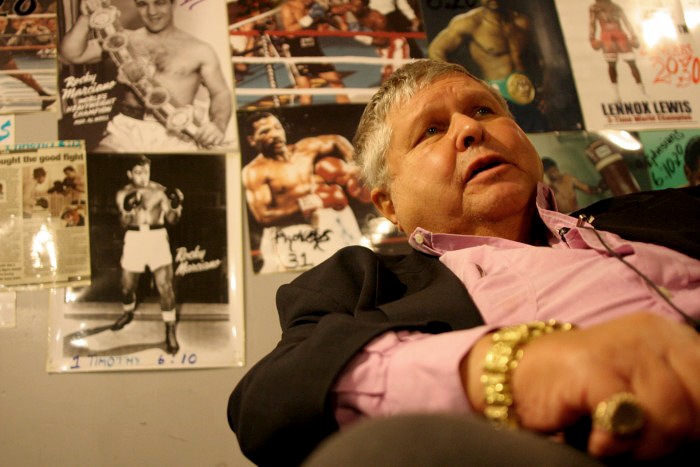
Over the years, Marvin “The Weasel” Elkind has seen mob figures come, and even more frequently, go. New wiseguys have replaced old ones. Some died violently, others disappeared behind prison walls. Once glorious heavyweight champs faded into obscurity. And then there were the ones like Hoffa, who seemed to simply vanish off the face of the earth, although Elkind believes he’s firmly ‘grounded’ in Detroit.
Despite all the changes over the years, Elkind has remained loyal to a sacred oath, and it has nothing to do with Omerta, although some find it equally intimidating.
“I’ll be married 50 years to the same lady in February,” he boasts, his tough exterior softening before my eyes.
“I married a very straight lady, on purpose, because I wanted her to give me straight kids, and she did. I’ve got two fantastic daughters. I always told them, you have a problem you come to me, I’m only here to solve your problems.”
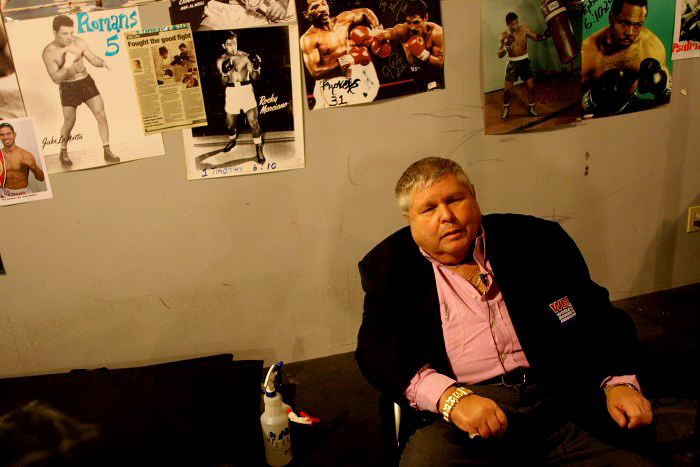
I had survived my “sit down” with Marvin “The Weasel” Elkind and it proved to be a fascinating experience.
Before we parted ways, I remembered a question I wanted to ask him.
“How did you get the nickname, “The Weasel?”
“I earned it kid,” he shot back with a sly wink, his pinkie ring gleaming.
“I earned it.”


